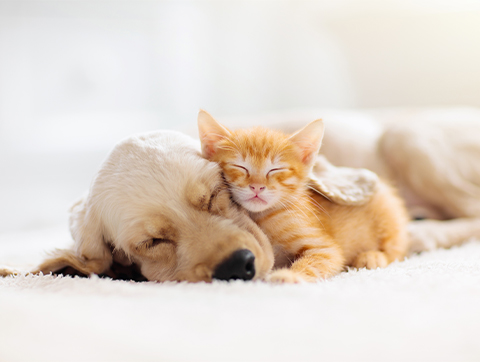Pets and Poisons

Overview
Pets can be poisoned by common household products, plants and foods. If you are concerned about a potential poisoning, contact your veterinarian immediately.
Call the 24-Hour Poison Help Line for Additional Support:
How to Keep Your Pet Safe
Make your home poison-proof. Follow these tips to protect your pets.
- Keep the telephone numbers for your veterinarian, an emergency clinic and the Poison Center in a convenient location.
- Keep household cleaning products out of reach of your pets, such as in cupboards or on high shelves.
- Throw away empty containers in a place where your pet will not play with them.
- Quickly clean up spills of gasoline, cleaning solvents and antifreeze. Antifreeze is especially dangerous because pets and children like the taste. Even a small amount can be fatal.
- Keep pets out of the area when using fertilizer, insecticides or herbicides.
- If you drop a pill, pick it up quickly. Human medications can be dangerous for pets. Never give your pet medication unless specifically prescribed by a veterinarian. Keep medications in a cabinet.
- Make sure the plants in your home and yard are not toxic. Check our plant list for more information.
- Use flea and tick sprays, shampoos and collars cautiously. Follow the directions. If your pet doesn’t act normally after you use these, discontinue use, rinse your pet in clean water and call your veterinarian.
- Put ant traps and rat and mice poison where pets can’t get to them.
- Keep alcohol away from your pet.
- Give your pet safe toys to chew on.
- Make sure you know what types of foods are safe for pets.
- Check our list of products and plants harmful to pets.
- Keep your pet in a pet-safe area when you’re not home.
- Store automotive products such as oil, gasoline and antifreeze where pets can’t access them.
Suspected Poisoning
If you think your pet has been poisoned, quickly follow these steps.
- If your animal is having a seizure, is unconscious or is having trouble breathing, contact your veterinarian immediately.
- Try to identify what your pet has eaten.
- If your pet vomits, note the appearance of the vomit. If there are pieces of a pill or plant in the vomit, put those in a plastic bag.
- Try to determine how much of the poison your pet has eaten.
- Note your pet’s behavior so you can explain it to your veterinarian.
- Do not try to get your pet to vomit unless your veterinarian tells you to do so.
If your pet has eaten a plant you think may be harmful:
- Remove any part of the plant that’s still in the mouth. Try to identify what type of plant it is.
- Gently rinse around the mouth with water.
- Let your pet drink a small amount of water.
- Look for swelling or reddening around the mouth, eyes and paws.
- Watch for foamy salivation.
- Check our plant list for more information about whether plants in your home and yard are toxic.
- Take the plant or pieces of the plant with you if you go to your veterinarian's office or an emergency pet clinic.